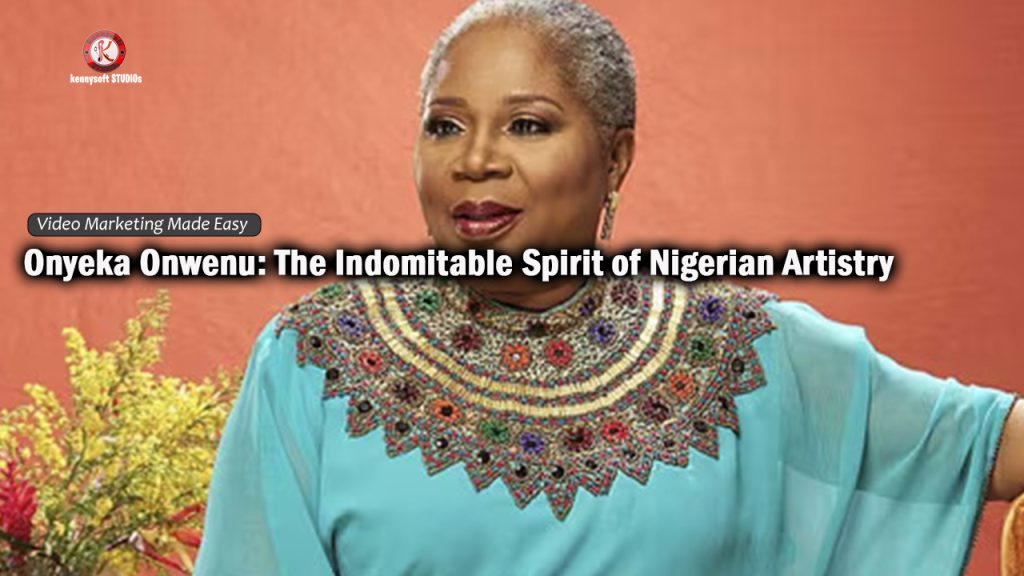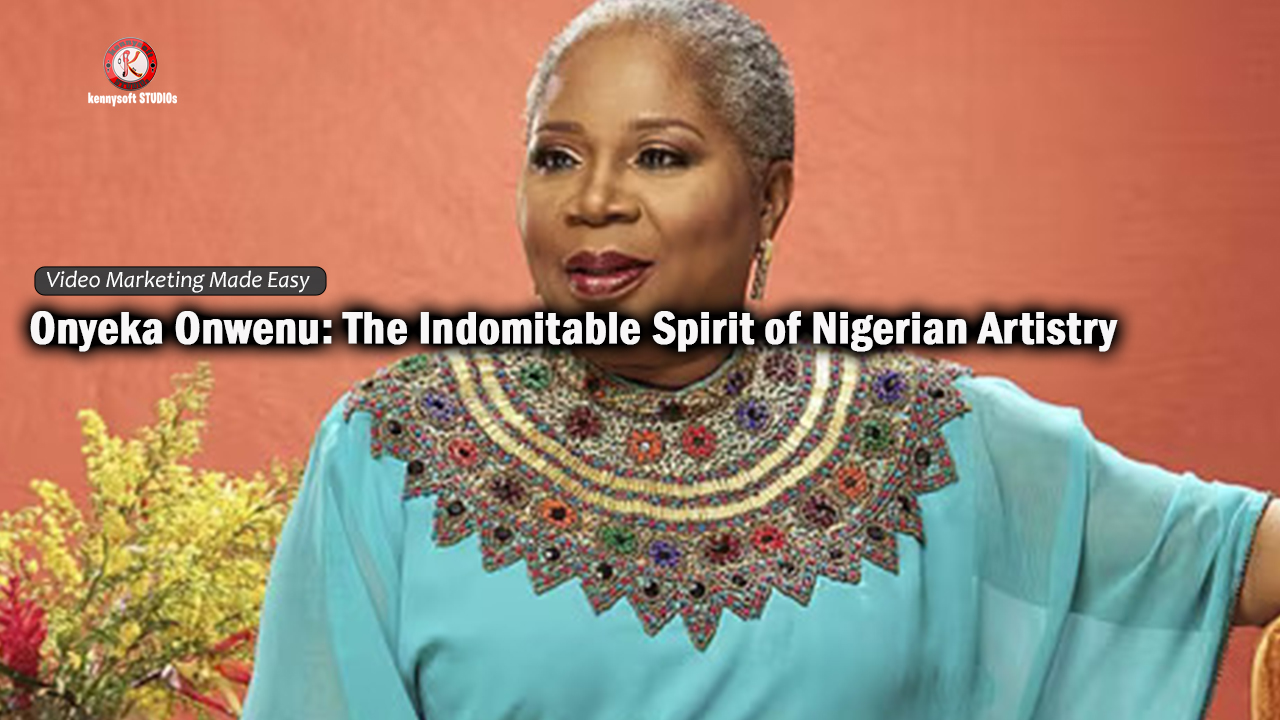
In the pantheon of African cultural icons, few shine as brightly as Onyeka Onwenu, the “Elegant Stallion” of Nigerian music. Her recent passing has left a void in the heart of a nation, but her legacy—a tapestry woven with the threads of music, activism, and unwavering dedication to her heritage—continues to inspire and influence. This tribute seeks to illuminate the extraordinary life of a woman who didn’t just participate in Nigerian culture; she helped define it.
The Genesis of a Legend
Born on January 17, 1952, in the vibrant port city of Port Harcourt, Nigeria, Onyeka Onwenu’s early years were steeped in the rich cultural milieu of post-independence Nigeria. The daughter of D.K. Onwenu, a prominent Nigerian politician, Onyeka was exposed to the complexities of Nigerian society from a young age. This upbringing in a politically active and culturally aware household would later inform her music and activism.
Onwenu’s formal education was as impressive as her artistic achievements. She earned a degree in International Relations and Communication from Wellesley College in Massachusetts, USA, and later obtained a master’s degree in Media Studies from The New School in New York. This blend of international exposure and deep-rooted Nigerian values would become a hallmark of her artistic expression.

A Voice That Defined an Era
Onwenu’s entry into the music scene in the early 1980s was nothing short of revolutionary. Her debut album, “For the Love of You” (1981), wasn’t just a collection of songs; it was a statement. In an era dominated by male voices, Onwenu’s powerful, emotive vocals cut through the noise, demanding attention and respect.
Her music was a fusion of styles that defied easy categorization. She seamlessly blended the soulful rhythms of highlife with the urgency of Afrobeat, the spiritual depth of gospel, and the universal appeal of pop. Songs like “Ekwe” became instant classics, their lyrics addressing social issues with a poetic touch that made them accessible to all.
One of her most iconic performances came in 1988 when she shared the stage with the legendary Miriam Makeba at the “Liveaid” concert in London. This moment wasn’t just a musical collaboration; it was a powerful statement of pan-African unity and female empowerment on a global stage.
Beyond the Music: A Multi-Faceted Icon
Onwenu’s talents extended far beyond her musical prowess. Her foray into acting showcased her versatility as an artist. In the 1984 film “One Dollar,” she delivered a performance that critics hailed as “raw and authentic,” proving that her ability to convey emotion wasn’t limited to her songs.
Her role in the television series “Winds Against My Soul” in the late 1980s tackled complex social issues, particularly those affecting women in Nigerian society. Onwenu’s portrayal of a woman navigating the challenges of tradition and modernity resonated deeply with audiences, sparking important conversations about gender roles and expectations.

The Activist’s Voice
Onwenu’s activism was not a separate facet of her life but an integral part of her artistry. In 1989, she released the album “One Love,” which included the track “Choices,” a powerful anthem advocating for women’s rights and reproductive health. The song became a rallying cry for women’s organizations across Nigeria and beyond.
Her commitment to social causes went beyond her music. In 2000, Onwenu was appointed as the Executive Director of the National Centre for Women Development. In this role, she spearheaded initiatives focused on economic empowerment, political participation, and health education for women across Nigeria.
One of her most impactful projects was the “Girls in STEM” program, launched in 2013, which encouraged young Nigerian women to pursue careers in science, technology, engineering, and mathematics. The program has since benefited thousands of girls, changing the landscape of gender representation in these fields in Nigeria.
Cultural Ambassador and National Treasure
Onwenu’s role as a cultural ambassador for Nigeria cannot be overstated. Her performances at international events, such as the 1988 Nelson Mandela 70th Birthday Tribute concert in London, showcased Nigerian culture to a global audience. She didn’t just perform; she educated, using her platform to shed light on African history and contemporary issues.
In 2006, Onwenu was honored with the National Order of Merit, one of Nigeria’s highest civilian honors, in recognition of her contributions to arts and culture. This accolade cemented her status not just as an entertainer, but as a national treasure.

The Lasting Legacy
As news of Onyeka Onwenu’s passing spreads, the outpouring of grief and appreciation from across the globe is a testament to her far-reaching impact. Fellow artists, politicians, and fans alike have shared stories of how her music touched their lives, how her activism inspired them to action, and how her unwavering commitment to Nigerian culture instilled in them a sense of pride in their heritage.
Young Nigerian artists like Yemi Alade and Tiwa Savage have cited Onwenu as a primary influence, praising her for paving the way for women in the Nigerian music industry. Her influence extends beyond music, with filmmakers and actors crediting her pioneering work in Nollywood for opening doors in the industry.
Conclusion: The Eternal Elegant Stallion
Onyeka Onwenu’s life was a masterclass in using one’s talents to effect positive change. Her music will continue to resonate through the streets of Lagos and the halls of power alike. Her activism will inspire generations of Nigerians to stand up for their rights and the rights of others. And her unwavering pride in her cultural heritage will serve as a beacon for those seeking to understand and celebrate the rich tapestry of Nigerian identity.
As we bid farewell to the “Elegant Stallion,” we are reminded that true artistry transcends entertainment—it has the power to shape societies, challenge norms, and inspire revolutions. Onyeka Onwenu embodied this truth in every note she sang, every role she played, and every cause she championed. Her physical presence may have left us, but her indomitable spirit lives on in the heart of Nigeria and in the souls of all those touched by her extraordinary legacy.
In the words of one of her most beloved songs, “One Love,” we are reminded of the unity and hope she always strived for:
“One love, one heart Let’s get together and feel alright”
Onyeka Onwenu’s life was a testament to these words, and her legacy ensures that this message will continue to resonate for generations to come.






